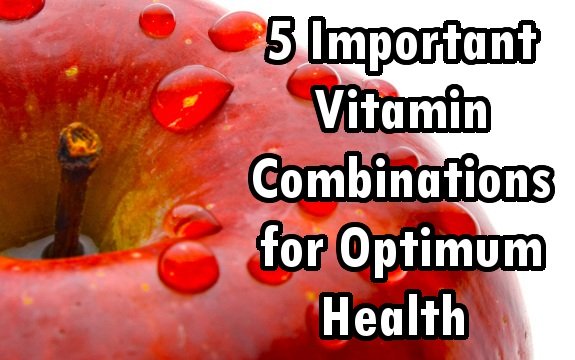5 Important Vitamin Combinations for Optimum Health

 We’ve all heard that we should take our vitamins, but did you know that combining certain nutrients helps the body to absorb them more readily, and can even boost their efficacy over taking the vitamin or mineral alone? Consuming vitamins together creates a synergistic effect in the body.
We’ve all heard that we should take our vitamins, but did you know that combining certain nutrients helps the body to absorb them more readily, and can even boost their efficacy over taking the vitamin or mineral alone? Consuming vitamins together creates a synergistic effect in the body.
Following are five important vitamin combinations to ward against disease and attain a great health boost:
1. Vitamin E and Sesame Seeds – Vitamin E is wonderful all on its own. It acts as an anti-inflammatory and antioxidant, guarding against cardiovascular disease. The only problem is that one of the important nutrients in Vitamin E, tocotrienols, are hard for the body to assimilate since only the fat and skin tissues can absorb them. Eating sesame seeds has been shown to improve absorption of Vitamin E tocotrienols by up to 500%.
2. Vitamin K and Vitamin D – These two vitamins all by themselves are powerhouses, but when used together they are a wonderful protective combo against osteoarthritis and osteoperosis. Vitamin D helps the body to absorb calcium so that our bones stay strong, and Osteoporosis International has concluded that lifetime supplementation with vitamin K1 or, even better, K2, vitamin D3, and calcium is likely to reduce fractures and increase survival in postmenopausal women.
Fresh, leafy organic greens are a great source of vitamin K, as are numerous herbs and paprika and cayenne. Vitamin D is found profusely in spinach, kale, okra, collard greens, and natural sunlight. Tossing a salad with a combination of Vitamin D and K greens is a great way to consumer both simultaneously.
Read: Vitamin K Deficiency Symptoms
3. Vitamin C and Iron – A study published in International Journal for Vitamin and Nutrition Research states, “A higher bioavailability of the dietary iron can be achieved by increasing the content of food components enhancing iron absorption (ascorbic acid, meat/fish) or by decreasing the content of inhibitors (e.g., phytates, tannins).” Iron deficiency is listed as one of the largest health issues by the World Health Organization.
Iron is found in egg yolks, vegetables, grains, nuts, seeds, and iron-fortified food products, but it is nonheme iron, which is less efficiently absorbed than heme iron, the type found in meat, poultry, fish and seafood. For vegetarians, iron deficiency is a risk since they don’t eat meat products full of readily absorbed iron. However, Vitamin C helps release a higher percentage of iron from nonheme sources, thereby boosting the body’s ability to absorb iron from foods wherein it is lacking.
4. Vitamin B12 and Black Pepper – B12 helps create your genes, protects your nerves, and aids in metabolism. It is responsible for the health of every single cell in your body, but it can be difficult to absorb because the stomach has to secrete enough acid in addition to a digestive enzyme called “pepsin” to extract vitamin B12 from food. Once it’s free, the nutrient then has to combine with a protein known as “intrinsic factor” secreted by the stomach lining, which protects it as it is being transported to the small intestine for absorption. Piperine, a component in black pepper, can help the body absorb B12. Also, you can minimize alcohol consumption to help the body assimilate this important vitamin.
5. Vitamin A and Beta-carotene increase the absorption of iron in rice, wheat, and corn – three of the most common foods eaten by humans. These crops feed a large portion of the world, but the nutrients in them could be significantly increased by just combing them with a little vitamin A and Beta-carotene. Rice alone has more than 40,000 different varieties with wide ranges in nutrient density. In fact, the presence of vitamin A increased iron absorption up to twofold for rice, 0.8-fold for wheat and 1.4-fold for corn. We don’t need GMO golden rice created by biotech. We can increase the bioavailability of foods just by eating them in proper combinations.
Read: 3 GMO Foods Likely in Your Multivitamin
Another way to help your body absorb all your vitamins more efficiently is to be sure to take supplements with food. Your body digests them better this way. Some supplements work against one another – like Calcium and Iron, so be certain to take those supplements separately. Vitamins B and E should be taken early in the day since they can boost your energy. Calcium supplements should be taken at night since the body rebuilds your bones while you sleep.
Overall, combine your vitamins intelligently, and you can make the most of all the nutrients they provide.

is a great way to consumer both simultaneously. ???